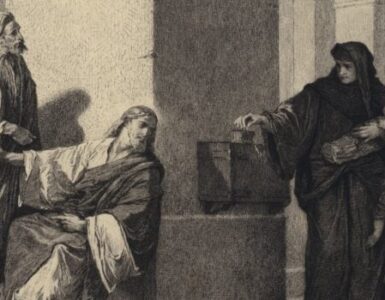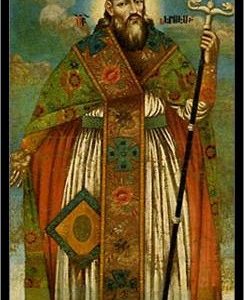The charity of Jesus in the Holy Eucharist is the medicine to help us truly love as God loves and to truly forgive as God forgives. So often we want revenge on those who harm us or hold onto bitterness as if we are the only ones in the world who have suffered. What is impossible for us is made possible by Jesus in the Holy Eucharist. St. Peter Julian Eymard reveals how Jesus’ Eucharistic Charity leads to meekness, especially towards one’s enemies:
What shall we say of the Eucharistic charity of Jesus? How may we fittingly express His kindness in receiving everybody; His affability in coming down to the level of all, the weak and the ignorant; His patience in listening to what everyone has to say, to the account of all our miseries; His goodness in Communion, in which He gives Himself to all according to their condition and comes into them with joy, provided He finds in them the life of grace, a little devotion, a few good desires, and at least a bit of respect, giving to each one the amount of grace he can carry and leaving peace and love as the price of His stay with us?
What patient and merciful meekness towards those who forget Him! He waits for them. He prays for those who despise and offend Him; He makes no complaint against them, nor does He threaten them. He does not punish on the spot those who outrage Him sacrilegiously, but by His meekness and kindness He tries to lead them to repentance. The Eucharist is the triumph of the charity of Jesus Christ.1
Jesus’ teachings are demanding and countercultural. But whoever said that reaching Heaven would be easy? Choosing hell, on the other hand, requires little effort. When Jesus told His followers to “love your enemies and pray for those who persecute you” (Matt 5:44), many probably responded like they did with His teaching on the Holy Eucharist: “This is a hard saying; who can listen to it?” (John 6:61). But there is hope, for what God commands us to do, He supplies the grace. And even more important, what God commands us to do, He Himself does. Jesus is the only preacher who perfectly lived out what He preached and who still lives out what He preaches in the Holy Eucharist! So yes, Jesus’ saying about loving one’s enemies is hard, but with the Holy Eucharist, the impossible becomes possible. Because of the Holy Eucharist, we can truly love God, our neighbor, and even our enemies. Hence our Lord’s Eucharistic charity is the clearest way we can live a godly life. The Holy Eucharist is the virtuous road to eternity.
How amazing is it that Jesus “does not punish on the spot those who outrage Him sacrilegiously, but by His meekness and kindness He tries to lead them to repentance”? Jesus seeks to win over His enemies by love and not revenge. What an example to follow!
When we experience any affront, persecution, or ungratefulness, we ought to go immediately before Our Eucharist Lord either physically or spiritually and give Our Lord this cross rather than complain or lash out at our enemy. We must always remember this truth: Jesus “prays for those who despise and offend Him; He makes no complaint against them.” Before the Holy Eucharist, we can tell Jesus, “Lord, I give you this injury that I have sustained. Please give me the grace to pray for this person as you pray for your enemies in the Holy Eucharist. If there is some truth to this person’s criticism, please reveal it to me. If not, help to forgive them as you have forgiven me so many times for offending you.”
St. Peter Julian Eymard mentions another key aspect of Jesus’ Eucharistic Charity. He states that Jesus never interrupts “although He knows beforehand what they will say to Him.”2 Furthermore, Jesus “knows how to be silent out of charity.” Too often we are more concerned with what we have to say than what others have to say, causing us to interrupt them and dominate the conversation. Sadly, we do this in our prayer lives with Jesus.
As our Eucharistic Lord patiently listens to our woes and welcomes us no matter how much we have offended Him, should we not do the same for others? Let us never forget that the “The Eucharist is the triumph of the charity of Jesus Christ.” The Holy Eucharist is meant to transform us into Jesus, for it is the par exemplar of His charity for mankind. With the graces and virtues that flow from the Holy Eucharist, we can become a living monstrance for the world, bringing Jesus’ love to others, especially to our enemies.
Photo by Mateus Campos Felipe on Unsplash
1St. Peter Julian Eymard, In the Light of the Monstrance, trans. Rev. Charles De Keyser (New York: The Sentinel Press, 1947), 89-90.
2St. Peter Julian Eymard, In the Light of the Monstrance, trans. Rev. Charles De Keyser (New York: The Sentinel Press, 1947), 89.










